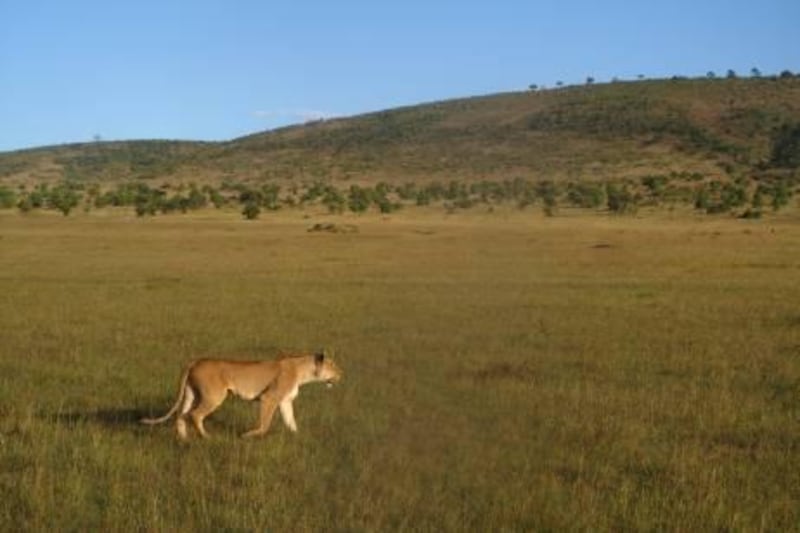I saw a lion today. In eight months in Africa, I'd yet to see a single lion. Now I can go home.
I'm writing my final "Around Africa" column from inside a tent in Kenya's Masai Mara Game Reserve, where I'm on a three-day safari, the sole purpose of which, from my point of view, is to see lions in the wild. I'd resolved not to leave Africa until I'd done so, and today it happened: a skinny-looking lioness, mouth agape, lazily stalking a mother buffalo and her calf until she decided it was too much bother and she'd rather lie down and enjoy the sunset.
Reflecting on the past eight months of travel, I come back to a quotation from Shunryo Suzuki, a Japanese Zen master: "As a Chinese poem says, 'I went and I returned. It was nothing special. Rozan famous for its misty mountains; Sekko for its water.' People think it must be wonderful to see the famous range of mountains covered by mists, and the water said to cover all the earth. But if you go there you will just see water and mountains. Nothing special."
Make no mistake. Africa is full of wonder and amazement. Suzuki uses "nothing special" as a metaphor for a state of mind said to be achieved by daily practice of a certain type of zazen meditation, but it applies quite literally to the traveller seeking extraordinary experiences. Before you achieve it, you think it must be something amazing, but once you have it, you realise it's nothing more than what was right in front of you the entire time.
The unnamed Chinese poet isn't let down by what he sees, no more than I was by my travels around Africa. The mountains and lakes are indeed beautiful. But if he came seeking an inner transformation that will change the way he perceives the world, the poet now knows he's been scratching at the wrong itch.
When I set out to travel around Africa overland in October 2010, I wanted to push myself to do something big. The overland route down the west coast of Africa isn't a well-trod path like Cairo to Cape Town or Istanbul to Kathmandu. I'd taken long overland trips before, but never such a distance: tens of thousands of kilometres through 21 countries, travelling almost entirely by bus, train, taxi and boat, never going anywhere near an airport check-in desk from Madrid down to Cape Town and up again to Dar es Salaam. In sections of this route, the logistics of public transport are undocumented by any guidebook. I felt special doing it.
Travelling overland yields a view of the landscape, both cultural and geographic, that I would have missed flying city to city. From Morocco, a land whose tiled courtyards, fountains and riads seem to have stepped out of a Taschen coffee-table book, the route crosses the Atlas Mountains and the Sahara, hitting the noise and colour of sub-Saharan Africa at the Senegal River. The red dust of the Sahel then gives way to rainforest overgrowth in central Ghana, and from there southward, around the great bend in the African coast, the jungle grows in great patches interspersed with savannah and grasslands.
The track becomes rough, and with tourists few and far between, the conversations become warmer and less geared towards trying to sell you something. At the Congo River, the geographic progression reverses itself: baobabs make their reappearance midway through Angola, the land becoming drier, culminating in the twisting red lines of the Namib desert dunes, until finally, in the Cape's monied winelands, you're back again in style-book territory.
Along the way, I found an Africa that was constantly on the move. People hardly think twice about sitting 10 hours crammed into a bush taxi to visit relatives. You'll share vehicles with housewives carrying sacks of onions and bundles of plantains from town to town, or small-scale merchants commuting to sell electronic goods, or a man who spends a day to get to a nearby village only to attend his work colleague's mother's funeral. Through a sustained experience of the unglamorous, it's easier to go beneath the surface strangeness of Africa, to see that even in the most alien parts, people still have the same basic needs, loves and foibles as anywhere in the world.
Perhaps one comes with images of cackling child soldiers baring white teeth and waving AK47s. The Congo River has been described as a wound that never stops bleeding, gushing out into the Atlantic. Or maybe, at the other end of the emotional spectrum, you're looking for a dimpled orphan that will make you see the world in a new way. But here's what happens: you arrive in this amazing land only to find it's just you again, plain old you, with the same nervous ticks you had back home, the same songs stuck in your head.
Granted, there were a lot of cute children. None of them had guns. My transformation was like the epiphany of the Chinese poet. Somewhere along the way, the alien became approachable. In Africa, bread gets mouldy and milk goes bad, just like it does anywhere. Mothers die and babies giggle and hearts are shattered into a million pieces and, yes, some wounds heal and some don't, and it's wonderful, it's horrible, but most of all, it's nothing special.
Relive Scott MacMillan's journey at Around Africa. He also blogs at the website www.wanderingsavages.com.





